
I do believe that before they can even speak or even in the mother's womb, classical music can help in the development of neural links in the developing brain. After birth, consistent exposure to classical music such as Mozart and Beethoven have been scientifically proven to increase neurological growth.
 Mental and physical activity is very important to support and nurture the child. At about five or six years old, they should be in a structured program of physical activity. I chose martial arts for my kids—not only because I did it growing up, but also because it achieves a couple of important goals for development.
Mental and physical activity is very important to support and nurture the child. At about five or six years old, they should be in a structured program of physical activity. I chose martial arts for my kids—not only because I did it growing up, but also because it achieves a couple of important goals for development.
First, it teaches consistency through a regular class schedule. Second, it builds an indomitable spirit—not giving in to peer pressure and always striving to improve. That "I can’t" attitude transforms into confidence through martial arts. When a child first sees a move they can’t do, they often say, “I can’t.” But after consistent practice, they not only do it—they excel at it.
Above all, martial arts teaches physical fitness, mental growth, and maturity. It helps them learn how to use their bodies for self-defense—for good, but also to understand its power if needed. Brazilian Jiu-Jitsu, unlike other martial arts, is like human chess. One movement requires a counter, and that counter has another counter. This helps a child develop the mental fortitude to handle challenges in all areas of life—whether in school, work, or relationships.
When a child faces a difficult problem at school—like a tough math question—they learn to approach it from different angles in order to achieve the goal of winning over at this problem. That’s the same mindset developed on the mats.
Jiu-Jitsu teaches self-confidence. As a child learns to use their body, how to conquer the mats, and improve their skills—whether in class or in tournaments—they develop the "can-do" attitude essential for growth in life and future careers. My kids learned these lessons from a very young age: consistency, discipline, and perseverance.

No, they didn’t always love being on the mats. But we taught them to push through challenges—to train even when they didn’t feel like it, or to be on the mats when all their friends were out playing. That sense of responsibility—to show up, to study, or to train despite so many other distractions out there —is what helped give them their Ivy League attitude.
Here at Global Brazilian Jiu-Jitsu, we strive to teach kids the same way I taught mine, and to guide adults the same way I push myself toward excellence. It may not be the right approach for everyone, but for those who are goal-oriented and want to become the best version of themselves, Global Brazilian Jiu-Jitsu is t he place to be.
he place to be.
Dr. Professor Kevin Lam
Global Brazilian JiuJitsu
4584 Enterprise Avenue
Bay 12
Naples, FL 34104
Register for free trial --> https://global1bjj.com/Home/Offer/
GLOBAL JIU-JITSU NAPLES
Global Brazilian Jiu-Jitsu
4584 Enterprise Avenue Bay 12
Naples, Florida 34104
Follow us on Instagram - @Global1BJJ
How to Raise Successful Children: — From a Father of Two Ivy League High Achievers
I do believe that before they can even speak—or even while in the mother’s womb—classical music can help in the development of neural links in the developing brain. After birth, consistency with classical music such as Mozart and Beethoven has been scientifically proven to increase neurological growth.
Mental and physical activity are very important to aid and nurture the child. Around five or six years old, they should be in a structured program of physical activity. I chose martial arts for my kids—not only because I did it growing up, but also because it achieves a few important goals for development.
First, it teaches consistency through a regular class schedule. Second, it builds an indomitable spirit—not giving in to peer pressure and always striving to improve. That "I can’t" attitude transforms into confidence through martial arts. When a child first sees a move they can’t do, they often say, “I can’t.” But after consistent practice, they not only do it—they excel at it.
Above all, martial arts teaches physical fitness, mental growth, and maturity. It helps them learn how to use their bodies for self-defense—for good, but also to understand its power if needed. Brazilian Jiu-Jitsu, unlike other martial arts, is like human chess. One movement requires a counter, and that counter has another counter. This helps a child develop the mental fortitude to handle challenges in all areas of life—whether in school, work, or relationships.
When a child faces a difficult problem at school—like a tough math question—they learn to approach it from different angles until they solve it. That’s the same mindset developed on the mats.
Jiu-Jitsu teaches self-confidence. As a child learns to use their body, conquer the mats, and improve their skills—whether in class or in tournaments—they develop the "can-do" attitude essential for growth in life and future careers. My kids learned these lessons from a very young age: consistency, discipline, and perseverance.
No, they didn’t always love being on the mats. But we taught them to push through challenges—to train even when they didn’t feel like it, or when their friends were out playing. That sense of responsibility—to show up, to study, or to train despite distractions—is what helped give them their Ivy League attitude.
Here at Global Brazilian Jiu-Jitsu Naples, we strive to teach kids the same way I taught mine, and to guide adults the same way I push myself toward excellence. It may not be the right approach for everyone, but for those who are goal-oriented and want to become the best version of themselves, Global Brazilian Jiu-Jitsu is the place to be.
Dr. Professor Kevin Lam
Global Brazilian Jiu-Jitsu
4584 Enterprise Avenue, Bay 12, Naples, FL 34104
www.Global1BJJ.com
